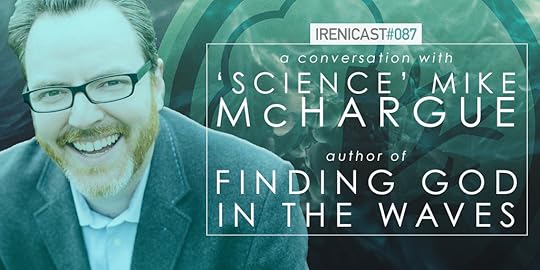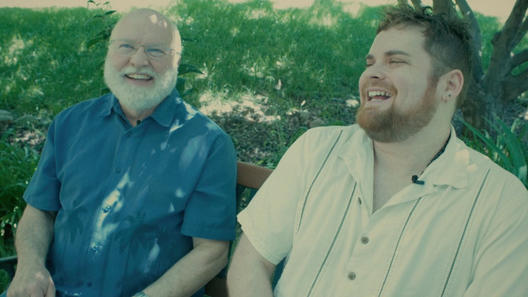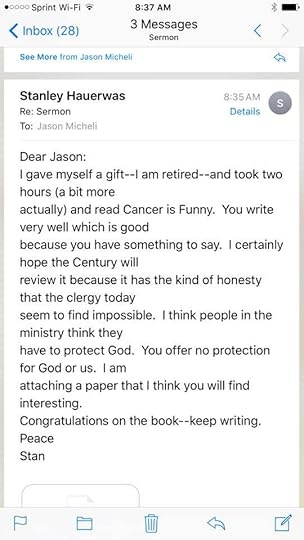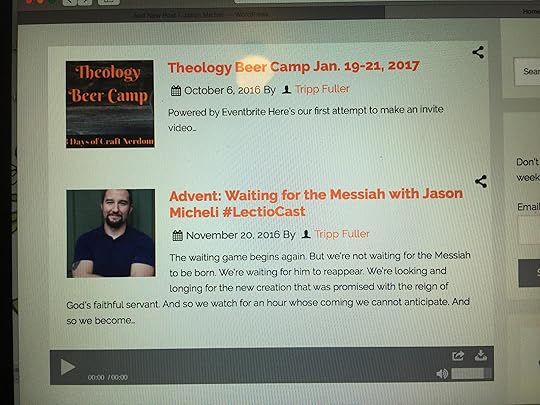Jason Micheli's Blog, page 151
December 13, 2016
Episodes 60 & 61: Advent & Standing Rock
 We never tire of working for you at Crackers & Grape Juice, and before you complain about the audio quality in #60 just remember we do this for you gratis in our spare time.
We never tire of working for you at Crackers & Grape Juice, and before you complain about the audio quality in #60 just remember we do this for you gratis in our spare time.
We’ve got two episodes that dropped early this week.
For Episode #60, the C&GJ posse got together to argue about Advent and my assertion that we’d be better off focusing on the second coming not during Advent but as part of the Ascension.
For Episode #61, Morgan spoke with Ana Yelsi Sanchez and Alicia Crosby about their experience as women of color at the Standing Rock protest.
Just a reminder:
The Cracker & Grape Juice team will be part of Home-brewed Christianity’s Theology Beer Camp this January in L.A..

Want to join us?
All you need to do is head over to theologybeercamp.com, click the button to buy tickets, and use the discount code below to receive $100 off:
BLITZEN4JESUS
But this discount will only be good through Christmas!
Be on the lookout for future episodes with Father James Martin and Mandy Smith.
You can download the episode and subscribe to future ones in the iTunes store here
We’re breaking the 1K individual downloaders per episode mark.
Help us reach more people:
Give us 4 Stars and a good review there in the iTunes store.
It’s not hard and it makes all the difference.
It’ll make it more likely more strangers and pilgrims will happen upon our meager podcast. ‘Like’ our Facebook Page too. You can find it here.
Oh, wait, you can find everything and ‘like’ everything via our new website: www.crackersandgrapejuice.com
If you’re getting this by email, here’s the permanent link to the episode.
Follow @cmsvoteup

December 12, 2016
God Can’t Love Us Apart from the Christ Child

The problem with many theories of the atonement, which imply that God ‘can’t’ love us- sinners that we are- until someone dies for the infinite offense, is that they neglect to notice how the gulf between Creator and creature is already so inconceivably severe that…
God can’t love us anyway.
Not if ‘love’ is to have any meaningful definition.
As Herbert McCabe argues:
One of the primary characteristics of any definition of love is equality between the lovers.
Love entails a recognition between two of the other’s existence as as valid as one’s own existence. To put the point more clearly, says McCabe, just consider how ‘fostered inequality’ registers with us as the opposite and enemy of love.
If equality is an essential attribute of a loving relationship, then it becomes evident that ‘whatever relationship there may be between God and his creature it cannot be one of love.’
The relationship is instead as unequal as it can possibly be.
We might think of God as caring benevolently for his creatures or as the Source of all value in them or as a Master rewarding/punishing them, but we can’t, McCabe argues, ‘think of God has giving himself in love to a creature.’
The gulf between Creator and creature is such that to say God loves me is on par with saying that I love yeast creature that made my beer possible.
Those hackneyed Christian songs might speak of the singer being in love with God, but it’s even more ridiculous to suppose the singer could sing about God being ‘in love’ with us.
McCabe, the philosophically trained might notice, takes with complete seriousness Nietzsche’s critique of the Christian God. Nietzsche didn’t argue that God was evil, wicked Boss in the sky; Nietzsche resisted because the relationship between God and us could never be anything other than Boss to slave.
That is, to Nietzsche the relationship between God and creatures could never be a relationship of love (between equals).
Nietzsche, in other words, did not disbelieve God; he rebelled against God. God in his estimation was not worthy of worship, for why would I care if the yeast creature in my beer worshipped me?
McCabe takes Nietzsche’s critique with seriousness and in turn laments how many have reacted to Nietzsche:
‘with a deplorable and idolatrous tendency to diminish God. In order that God may stand in relationship with his creatures, God is made one of them, a member of the universe, subject to change and even disappointment and suffering. Even the Christian doctrine of the Incarnation is interpreted in these terms.’
God CAN’T love us, McCabe (a Dominican priest, no less) argues.
And this is where Herbert pivots to scripture:
“The most important thing Jesus said (and he does not only say it in John’s Gospel but shows it and implies it in a thousand ways) is something about himself: the Father loves him.”
Italics all McCabe all the way.
To sing ‘Jesus loves me for the bible tells me so’ is to miss the point in McCabe’s mind. We should be singing: ‘God loves Jesus…for the bible tells me so.’
For Jesus to claim the Father loves him is itself to announce equality with God, that sort of equality implied by and required for love.
Jesus, the Incarnate Logos, is the (only) One who makes it possible for God the Creator to love his creatures. And we Him.
It’s not just Sin that separates us- of course Sin doesn’t help.
God, McCabe, says, loves Jesus and loves him from before all time as his co-equal Son, ‘owing his existence indeed to God though not created but, as I suggest, loved into existence.’
Regardless of what went down in the Garden, the Son would’ve still come down to be Mary’s son because:
‘it is into this eternal exchange of love between Jesus and the Father that we are taken up, this exchange of love that we call the Holy Spirit.
And this means, of course, that we are taken up into equality, the equality demanded by and involved in love.’
Nietzsche was right.
God could not love creatures. God still cannot.
What did Nietzsche miss, according to McCabe?
We’re no longer just creatures. Because the Son became a creature, we creatures now share in the Son.
God can’t love us, but God loved the Son.
And in the Son, through the Spirit, the Father loves us.
We who were once creatures have been made children of God.
Follow @cmsvoteup

December 8, 2016
At-onement Apart from the Cross
 At-One-Ment
At-One-MentIt was the Council of Chalcedon in the mid-5th century that hammered out the Christology (‘speech about Christ’) that became orthodox for Christians everywhere. According to the Chalcedon formula, the best way to refer to Jesus Christ is as ‘the God-Man.’
Makes him sound like a super-hero, I know, which is unfortunate since that’s the last thing the Church Fathers were after. Their formula was just the best way to insure that latter day Jesus-followers like us didn’t forget that Jesus the Son is true God and true Man, without division or confusion between his two natures.
He is fully both God and Man.
And, in a latent sense, he has always been both.
Eternally.
In other words, the Son who is the 2nd Person of the Trinity was always going to be the eternal Son who became incarnate and thus the son of somebody like Mary.
According to Maximus the Confessor– indisputably one of the greatest minds in the history of the faith, someone who could even out smoke, out drink and punch out Karl Barth:
the Chalcedonian formula necessitates that we affirm that the incarnate Logos is the elect unifier of all things that are separated.
Whether- and this is key- by nature or by sin.
We all know Sin separated us from God. That’s an every Sunday, altar call kind of presumption- so much so, in fact, that we neglect to remember or notice that less nefarious but even more fundamental fact separates us from the infinite.
Our finitude. Our createdness. Our materiality.
That the son of Mary is the eternal-eventually-to-become-incarnate Son of the God we call Trinity shows, says Maximus, that the Logos is the One through whom all things physical and spiritual, infinite and finite, earthly and heavenly, created and uncreated would be united and made one.
Union, says Maximus, was God’s first and most fundamental aim.
At-onement of a different sort.
Jesus isn’t made simply to forgive or die for our sins. Because if Christ is the God-Man, then everything goes in the other direction.
Jesus isn’t made for us; we were made for him. By him.
We are the ones with whom, through him, God wants to share God’s life.
It’s not that Jesus is the gift God gives us at Christmas; it’s that at Christmas we finally discover that we’re the gift God has given to himself.
We’re the extravagance the superabundant love of Father, Son and Spirit gratuitously seek to share with one another.
Jesus is the reason for the season, but the reason for Jesus is that before the stars were hung in place, before Adam sinned or Israel’s love failed God’s deepest desire is, was and always will be friendship.
With us.
Follow @cmsvoteup

Episode 59: Science Mike McHargue – Finding God in the Waves
 For Episode 59, Morgan and Mike talk about growing up as weird nerdy kids. Mike shares about his loss of faith and powerful encounter with Jesus on the beach that brought him back to Christianity. Then Mike talks about the brain science of fundamentalism and other nerdy topics.
For Episode 59, Morgan and Mike talk about growing up as weird nerdy kids. Mike shares about his loss of faith and powerful encounter with Jesus on the beach that brought him back to Christianity. Then Mike talks about the brain science of fundamentalism and other nerdy topics.
The Cracker & Grape Juice team will be part of Home-brewed Christianity’s Theology Beer Camp this January in L.A.. There’s only 15 tix left so if you’d like to be a part of it, check it out here. Be on the lookout for future episodes with Father James Martin and Mandy Smith.
You can download the episode and subscribe to future ones in the iTunes store here
We’re breaking the 1K individual downloaders per episode mark.
Help us reach more people:
Give us 4 Stars and a good review there in the iTunes store.
It’s not hard and it makes all the difference.
It’ll make it more likely more strangers and pilgrims will happen upon our meager podcast. ‘Like’ our Facebook Page too. You can find it here.
Oh, wait, you can find everything and ‘like’ everything via our new website: www.crackersandgrapejuice.com
If you’re getting this by email, here’s the permanent link to the episode.
Follow @cmsvoteup

December 7, 2016
The Incarnation Isn’t Accidental

When we say that Jesus comes in order to suffer for our Sin- that he’s born to die- we suggest that suggest that Jesus might not have come.
The incarnation then is ‘accidental’ in the way the philosophers used the term; that is, God taking flesh is occasioned by Sin and not something more determinative and essential.
The incarnation then is something less than an eternal, unchanging decision of God’s.
But that goes against the grain of what scripture tells us in Colossians: that the Son is the image of the invisible God, the first born of all creation through whom all things we’re made. Or as John testifies, in the beginning, before creation had a beginning, was the Word.
Before God had determined to create us, before God had ‘decided’ to save us from Sin, scripture tells us that God had decided eternally to be God for and with us.
To be God the Son, the God who would take flesh.
Jesus’ arrival can’t be limited to his role in saving creation from Sin because God’s decision to become incarnate precedes creation itself.
Put the other way around, as Nicolas Malebranche argued, if the incarnation is not a metaphysical necessity apart from the Fall then there is no purpose for God’s act of creation itself.
The way we so often speak of creche and cross mis-orders God’s intentions, implying that Christ is made for us rather than we for him.
As the 13th century theologian, Duns Scotus, put it:
“The Incarnation of the Son of God is the very reason for the whole Creation.
Otherwise this supreme action of God would have been something merely accidental or ‘occasional.’
Again, if the Fall were the cause of the predestination of Christ, it would follow that God’s greatest work was only occasional, for the glory of all will not be so intense as that of Christ, and it seems unreasonable to think that God would have foregone such a work because of Adam’s good deed, if he had not sinned.’
To think the incarnation is something less than an eternal, unchanging decision of God’s raises not just scriptural problems, but logical ones too.
If the incarnation is not an eternal decision of God’s, if the incarnation is not something God was always going to do irrespective of a Fall, then that means at some point in time the immutable God changed his mind about us, towards us.
Those who insist that Jesus was born in order to die attempt to safeguard an interpretation of one doctrine (substitutionary atonement) at the expense of an even more fundamental divine attribute:
God’s immutability.
God’s unchanging nature.
And this isn’t simply an abstract philosophical problem, for if God changed his mind at some point in the past about humanity, then what’s to stop God from changing his mind again in the future?
What’s to stop God from looking at you and your life and deciding that the Cross is no longer sufficient to cover your sins?
It’s true that Jesus saves us. It’s true that his death and resurrection reconcile God’s creation. It’s true that through him our sins are both exposed and forgiven once and for all, but that’s not why he comes.
That’s not why he comes because the even deeper mystery is that he would’ve come anyway.
Because he was always going to come.
Follow @cmsvoteup

December 6, 2016
Episode 58: Mike Morrell – The Divine Dance
 For Episode 58, Teer and Morgan caught up with Mike Morrell to talk about his new book with Richard Rohr, The Divine Dance: The Trinity and Your Transformation.
For Episode 58, Teer and Morgan caught up with Mike Morrell to talk about his new book with Richard Rohr, The Divine Dance: The Trinity and Your Transformation.
In the pages of this book, internationally recognized teacher Richard Rohr circles around this most paradoxical idea as he explores the nature of God—circling around being an apt metaphor for this mystery we’re trying to apprehend. Early Christians who came to be known as the “Desert Mothers and Fathers” applied the Greek verb perichoresis to the mystery of the Trinity. The best translation of this odd–sounding word is dancing. Our word choreography comes from the same root. Although these early Christians gave us some highly conceptualized thinking on the life of the Trinity, the best they could say, again and again, was, Whatever is going on in God is a flow—it’s like a dance.
But God is not a dancer—He is the dance itself. That idea might sound novel, but it is about as traditional as you can get. God is the dance itself, and He invites you to be a part of that dance. Are you ready to join in?
The Divine Dance recently provoked this incredibly uncharitable review at the hyper-Calvinist site for the Gospel Coalition.
Any frenemy of the Gospel Coalition is a friend of mine.
So, by all means, help support Mike’s and Father Rohr’s work and get the book!
Check out Mike’s project at Speakeasy too. He’s been responsible for sending some of the books I’ve reviewed here on the blog in the past.
The Cracker & Grape Juice team will be part of Home-brewed Christianity’s Theology Beer Camp this January in L.A.. There’s only 15 tix left so if you’d like to be a part of it, check it out here. Be on the lookout for future episodes with Father James Martin and Mandy Smith.
You can download the episode and subscribe to future ones in the iTunes store here
We’re breaking the 1K individual downloaders per episode mark.
Help us reach more people:
Give us 4 Stars and a good review there in the iTunes store.
It’s not hard and it makes all the difference.
It’ll make it more likely more strangers and pilgrims will happen upon our meager podcast. ‘Like’ our Facebook Page too. You can find it here.
Oh, wait, you can find everything and ‘like’ everything via our new website: www.crackersandgrapejuice.com
If you’re getting this by email, here’s the permanent link to the episode.
Follow @cmsvoteup

December 5, 2016
The Hairy Mole in the Manger
 For this weekend’s sermon, I decided to preach an ‘old’ sermon to coincide with the launch of new book. This was actually the last sermon I preached before I cancer whisked me away from the pulpit for a year. Some of this makes its way into the first chapter of the book.
For this weekend’s sermon, I decided to preach an ‘old’ sermon to coincide with the launch of new book. This was actually the last sermon I preached before I cancer whisked me away from the pulpit for a year. Some of this makes its way into the first chapter of the book.
In addition to the Isaiah lection for 2nd Advent, my text was 2 Corinthians 5.17-21
‘God was in Jesus reconciling the world to himself…’
So I’ve got this mole, right here on my shoulder.
It’s not gross or anything. It’s just large and discolored and has a few hairs growing out of it. ‘Suspicious’ my former pre-med Mrs calls it, right before she points at it and quotes that line from Uncle Buck about finding a rat to gnaw it off.
My wife, Ali, had been after me for months to go to the doctor and get it checked out. But, because I’m an idiot, instead of going to the doctor I consulted WebMD, a website- I’m now convinced- that was designed by ISIS to frighten Western infidels. If you haven’t checked out WebMD already, don’t. (Right after Breitbart) it’s the most terrifying internet you’ll ever browse.
I consulted it for a suspicious mole, and 12 hours later I logged off in black despair, convinced that I suffer from IBS and TB, convinced that my kids have ADHD and maybe scolios too and that I might as well pre-order those little blue pills because ‘that’ is likely right around the corner for me as well.
To be honest, even though I spend 2-3 hours every day admiring myself in the mirror, I didn’t even notice the mole was there. I didn’t realize it was there until the summer when I took my shirt off at the pool and Ali threw up a little bit in her mouth.
Now as all you Waynewood Pool members already know, me taking my shirt off at the pool is normally an Event (with a capital E). A moment that provokes jealousy among men, aspiration among boys and awakens 50 shades of Darwinian hunger in women.
Like Bernini unveiling his David, normally me taking my shirt off at the pool is a siren call, overpowering all reason and volition and luring the primal attention of every female to be dashed against this rock.
But I digress.
The point is when I took my shirt off at the pool that summer and saw Ali wipe the vomit from the corner of her mouth it got my attention.
Ali got after me to go to the doctor. My youngest, Gabriel, who tried to biopsy my mole for his new microscope, got after me. My mom, who is a nurse, got after me. And the voice in my head confirmed what WebMD and all the rest had told me.
But my personal philosophy has always been that if you wait long enough the worst will always happen so for months and months I didn’t do anything about it.
Then one behind-closed-doors-kind-of-night Ali whispered across the pillow that she was never going to touch me again until I scheduled an appointment.
I called the doctor the next morning.
Of course, because I have health insurance, I can’t just call the dermatologist to schedule an appointment. No, that would make us socialists.
No, first I had to blow a morning and a co-pay at the general practitioner in order to get a referral to the skin doctor.
The nurse at the general practitioner’s office weighed me and, with a toll booth worker’s affect- took my blood pressure. Even though I told her I was just there for my mole, she insisted on typing my age into her tablet and asking me the questions that my age automatically generated.
First question: Have you experienced depression or thoughts of suicide in the past month?
Her second question was ‘Have you noticed an increase in memory loss recently?’ ‘Not that I recall’ I said.
Stone-faced, she moved on to her third question, asking for the date of my last prostrate exam. ‘Uh, never’ I stammered and, not sensing my sudden anxiety, she asked me when I’d had my last colonoscopy.
‘Wait,’ I said, ‘I’m not old enough to need those things done, am I?’
‘Just about’ she replied.
‘In that case can we go back to the depression question?’
Ten days, a copay and 3 double-billing mistakes later I went to the dermatologist, clutching my referral like a winning lotto ticket.
When I last went to the dermatologist in 1994 as a puberty-stricken middle schooler, the dermatologist’s office was one step above the guy who showed up at gym class and told you to turn your head and cough.
Now, it’s like something from the Capital in the Hunger Games.
I walked into the steel and glass, Steve Jobs-like office where a receptionist with impossibly purple hair and a dress made of feathered, bedazzled boas handed me paperwork on a clipboard and told me to have a seat.
‘All I Need for Christmas’ was playing overheard on the stereo while a flatscreen on the adjacent wall advertised the dermatologists’ many services to do away with age, imperfection and just garden variety ugliness.
A slide advertising the office’s newest service, eyebrow implants, slid horizontally across the plasma screen.
Judging from the model’s face on the screen, eyebrow implants are a procedure designed to give septuagenerian realtors Alex Trebeck mustaches above their eyes.
The next slide was a photo of the office itself along with its staff, centered above a cursive catchphrase. Their mission statement.
“Feel as perfect on the outside as you do on the inside.”
And as I started to fill out the paperwork, I wondered what sort of psychotic person came up with a slogan like that.
I mean- if the goal is to appear on the outside how I normally feel about myself on the inside, then I’m already as ugly as I need to be.
Bruce Springsteen’s ‘Santa Claus is Coming to Town’ started to play as a door opened and a nurse, who looked a little like the supermodel Elizabeth Hurley, called for Mr. Michelle.
Liz led me through a maze of hallways to a room so antiseptically bright I half-expected to be greeted by the Giver.
Inside the exam room, Liz handed me a hospital gown and instructed me to take off all my clothes and promised that the doctor would be in in a few minutes.
‘All my clothes?’ I begged for clarification.
‘Yep, even your underpants’ she said.
For some reason Liz Hurley using the word ‘underpants’ on me made me feel like a 5 year old boy whose mother makes him follow her into the ladies’ room.
She closed the door gently behind her as I unfolded the baby blue gown.
Now, I’ve spent a lot of time in hospitals, but I’ve never been a patient before and most of the patients I do see are underneath sheets and blankets.
Now that I held my own hospital gown in hand, I discovered that the correct way to wear it is not as self-evident as you might think.
Are you supposed to wear it open in the back, like a cowboy’s chaps? Or should you wear it open in the front, like a bathrobe? Or maybe, I pondered, you should take your particular ailment as a guide?
Since my mole- the cause for my visit- was on the front of my body, I reasoned, I decided upon the latter ‘style.’
So there I sat, like The Dude in The Big Lebowski except I didn’t have a White Russian in hand.
And, I was naked.
If I was unsure about the correct way to wear the gown, I got my answer when the doctor knocked, entered, and immediately snorted and said ‘Oh my.’
‘I wasn’t sure…’ I started to explain, but he waved me off and said ‘It’s okay, not a problem. You won’t have it on for long anyway.’ Words that proved to be more auspicious than temporal.
‘Are you cold?’ he asked, looking at me. ‘We can turn up the heat.’
‘No, I’m fine.’
The doctor sat down on a round stool in front of a black computer and I proceeded to give him my professional diagnosis based on my degree from WebMD.
He listened and rolled his eyes only once when I told him my suspicions of also having MS and when I finished said ‘Let’s have a look.’
So I showed him my mole, which- I’ll point out- was very easy to do since I was sporting the gown like a smoking jacket.
He looked at it for a few moments, looked at it through a magnifying glass for a few moments more and then, just as Rod Stewart started to sing ‘Have Yourself a Merry Little Christmas,’ the doctor said ‘I don’t think there’s anything to worry about. The hairs growing out of it make it look worse than it is.’
Relieved, I started to get up to get ready to go, but the doctor said: ‘Not so fast. While you’re here, we should probably do a full body scan.’
‘We?’ I wondered to myself as he left and returned a moment later with Liz Hurley, who- I noticed- struggled to suppress a giggle when she saw me in the gown.
With Liz gawking on, he proceeded to peel back my gown like it was cellophane on a pound of ground beef, which is probably a good analogy because there’s nothing quite like being naked, perched on top of butcher paper, clutching your bait and tackle to make you feel like a piece of meat- that grayish, 50% off, sell-by-today-kind-of-meat.
The date-rapey Christmas song ‘Baby, It’s Cold Outside’ started to play, which seemed appropriate since they then both started to bend me in impossible positions as though I was a yoga instructor or Anthony Wiener on the phone.
Bending and contorting me, they both picked over my every freckle and blemish like we were a family of lice-ridden Mandrills.
‘Anything suspicious down there?’ he asked ominously.
‘I hope to God not’ I said, but apparently invoking the deity did not provide sufficient medical certainty for him because he took his examination south, which was when he decided- for some reason- to ask me what I did for a living.
Normally when strangers ask me my profession, I lie and tell them I’m an architect. It helps avoid the awkward and endless conversations that the word ‘clergy’ can conjure.
But with no clothes on and even less dignity, there seemed to be little reason to pretend.
‘I’m a minister’ I said.
‘Really? What tradition? You’re obviously not a rabbi’ he said with a wink.
‘I’m a Methodist minister’ I said.
‘My grandmother was a Methodist’ he muttered.
Maybe it was because this was about the last position I wanted someone associating their grandma with me or maybe it was because the whole situation was so impossibly awkward, but once I started talking I found I couldn’t stop.
You’d be amazed how interesting you can make denominational distinctions sound when you’re as in the buff as Wilfred Brimley in Cocoon and being pawed over like a 4-H cow.
John (Cougar) Mellencamp’s ‘I Saw Mommy Kissing Santa’ came on as the doctor finished and said in a measured tone: ‘You do have some moles on your back that concern me.’
Then he ordered me to sit back down and lean forward as far as I could, which I did, clutching the last corner of my gown against my loins.
The doctor took a black sharpie and drew circles on my back, which struck me in the moment as not very scientific; meanwhile, Liz Hurley grabbed a digital camera off the supply counter.
Under normal circumstances, the combination of supermodel, a nurse’s outfit and a digital camera would pique my interest, but somehow I knew what was next.
She told me to lean forward again so she could snap some close-ups of my back, which she did with slow, shaming deliberation. Then, I can only assume to degrade me further, she actually showed me the close-ups of my back.
Now it was my turn to throw up a little in my mouth.
‘That’s what I look like from behind? It’s like a flesh-colored Rorschach test. I should call my wife and tell her I love her’ I said to no one in particular.
She laughed and said: ‘The images are magnified so don’t worry. Trust me, everyone appears kind of ugly and gross when you get up that close for a look.’
‘And that’s not even the ugliest part about me’ I said.
She frowned. ‘Do you think there’s something we missed?’
‘No, no, you were thorough all right’ I said, ‘I was just thinking of something else- my soul.’
‘I guess that’s your speciality, huh Father?’ Liz laughed.
The doctor laughed too.
They thought I was joking. They both thought I was joking.
James Taylor was finishing his rendition of ‘Lo, How a Rose Ere Blooming,’ that line that goes ‘…true man, yet very God, from sin and death he saves, and lightens every load’- he was singing that line as I sat on the butcher paper and watched as Liz loaded the snapshots of me onto the black computer.
Watching each unflattering image first pixilate then load on to the screen in front of me, I thought again of that cursive catchphrase in the lobby and what rubbish it was: “Feel as perfect on the outside as you do on the inside.”
Because if you could get close up- all over- to me, not just looked at my skin but lived in my skin, lived my life- and not just in my shoes but in my flesh- then you could come up with a lot more ugly, indicting pictures of me than a hairy mole.
Because the cold, incarnate truth is, I’m even more pockmarked and blemished on the inside than I will ever appear on the outside.
On the inside-
I’m impatient and petty. I’m judgmental and a liar. I’m angry and insecure and fearful and unforgiving and…and I’m just a normal guy.
The cold, incarnate truth is- if you stripped me all the way down, not just of my clothes but of my pretense and prevarications, stripped off the costumes I wear and the roles I play right down to my soul, then you’d see how unsightly I really am.
I mean, the prophets Isaiah and John the Baptist wouldn’t tell us to make straight the pathways for the Lord if we weren’t all twisted up, tangled and knotted on our insides.
And really, that was what was so unbearable about baring it all in that exam room. It reminded me how seldom I allow myself to be made vulnerable.
What being exposed exposed was just how much I try to cover up my true self. What being revealed revealed was how often I hide behind masks and manipulations, how often I fail to be authentic because I’m afraid of failure, how seldom I’m fully, genuinely me with others because I’m convinced there’s a whole lot of me I don’t think is worth sharing.
So I pretend.
I act like everything’s alright when it’s not. I pretend me and mine are happy when maybe we’re not. I act like I’ve got my _______ together even when my _______’s falling apart all around me. I project strength when I feel weak, and I wear other people’s projections of me like masks.
I don’t keep it real. I pretend. I play-act. I hide.
And so do you.
And since we’re baring it all, we might as well go full monty: the truth is we feel the need to hide and pretend and put on a good face more at Christmas than any other time of the year.
Which is odd.
Because when it comes to Christmas, we don’t just believe that God takes flesh. We don’t just believe that God puts on skin. We don’t just believe that God puts on a body. We don’t just believe that God puts on Jesus’ body.
No, we believe that, at Christmas, God assumes- puts on, takes on- our humanity.
All of it. Every bit. Of every one of us.
The pathway God chooses to get close to us is our humanity- all of it, every bit of it.
Every bit of every one of us.
On the stereo Aretha Franklin belted out ‘Hail, hail the Word made flesh, the Babe, the Son of Mary’ from the second verse of ‘What Child as This.’
As Aretha sang and Liz finished up with my snapshots, the doctor gave me a patently false promise about not feeling a thing just before he started to dig out my first mole with the finesse of a mobbed-up Italian barber from North Jersey.
Hearing Aretha overheard and seeing my snapshots on the computer screen and thinking of my shame that morning and every unsightly truth it brought to mind, I thought of St. Gregory.
Gregory of Nazainzus.
The 4th century Church Father who taught that what it means to say ‘God was in Christ,’ as Paul puts it in 2 Corinthians, is to say that all of our humanity is in the God who was in Christ.
All our humanity. Every bit of every one of us.
It has to be.
Otherwise, as Gregory put it, ‘that which is not assumed is not healed.’
Those parts of humanity not taken on by God in Christ are not healed.
Those embarrassing parts, those imperfect parts, those shameful and fearful and broken parts of us- if it’s true that Christ comes to save all then all those parts of us are in him; otherwise, they’re not healed.
Every bit of every one of us is in Him, Gregory says.
So there’s no need to hide. There’s no to pretend. There’s no need for shame or masks. We can give every embarrassing bit of our selves over to him because it’s already in him.
We’re not perfect on the outside and we don’t need to pretend that we are on the inside because every part of us is in him already.
Says Gregory.
————————-
With the gentleness of a cycloptic, differently-abled butcher, the doctor removed the rest of my blemishes and finished up by saying ‘You should come back in a year so we can do this again.’
‘I can’t wait’ I said as I started unfolding my street clothes.
Dressed, with my back looking like Clint Eastwood’s in Pale Rider, I found my way back to the lobby.
Someone, I’m not sure who, was on the stereo singing “Cast out our sins and enter in, Be born to us today.”
O’ Little Town of Bethlehem.
The plasma screen on the lobby wall was back to flashing their mission statement: “Feel as perfect on the outside as you do on the inside.” Accompanied by phony photos of people who pretended to feel both.
And, as I left, I said a little ‘Thanks be to God’ to myself because that that is not our Gospel.
Follow @cmsvoteup

December 1, 2016
Episode 57: Cancer is Funny – with Kendall Soulen, Tony Jones, JC Herz, Jeff Pugh, and Todd Littleton
 For Episode 57: Teer linked up with an all-star lineup for a conversation about Jason’s new book, “Cancer is Funny.”
For Episode 57: Teer linked up with an all-star lineup for a conversation about Jason’s new book, “Cancer is Funny.”
Rolling Stone writer and author of Learning to Breath Fire, JC Herz offered her thoughts along with Tony Jones, author of Did God Kill Jesus?, Todd Littleton, host of Patheological Podcast, Jeff Pugh, author of Religionless Christianity, and Kendall Soulen, Professor of Theology at Emory University.
All of them chimed in on why cancer is funny and why this book is needed in our theological discussions. And Taylor Mertins intros with a reflection that made me tear up putting this post together.
All of the guests know Jason from different arenas of Jason’s life and because of that you will hear differing perspectives on Jason’s newest book.
Buy the book! In case you needed a reason:
In case you needed another reason, listen to the podcast below.
The Cracker & Grape Juice team will be part of Home-brewed Christianity’s Theology Beer Camp this January in L.A.. There’s only 15 tix left so if you’d like to be a part of it, check it out here.
You can download the episode and subscribe to future ones in the iTunes store here
We’re breaking the 1K individual downloaders per episode mark.
Help us reach more people:
Give us 4 Stars and a good review there in the iTunes store.
It’s not hard and it makes all the difference.
It’ll make it more likely more strangers and pilgrims will happen upon our meager podcast. ‘Like’ our Facebook Page too. You can find it here.
Oh, wait, you can find everything and ‘like’ everything via our new website: www.crackersandgrapejuice.com
If you’re getting this by email, here’s the permanent link to the episode.
Follow @cmsvoteup

November 30, 2016
“Waiting for the Messiah with Jason Micheli: Part Deux”
 The Home-Brewed Christianity #LectioCast was kind enough to invite me as a guest for the next two weeks to talk about my new book, Cancer is Funny, and discuss the Advent lectionary readings.
The Home-Brewed Christianity #LectioCast was kind enough to invite me as a guest for the next two weeks to talk about my new book, Cancer is Funny, and discuss the Advent lectionary readings.
Hosted by Dr. JR Daniel Kirk, #LectioCast aims to get preachers’ jumpstarted on their prepcrastination by honing in on issues and themes in the scripture passages assigned for the upcoming Sunday and to do so in a way that is sharp, practical, and seasoned with a bit of snark.
Daniel accuses me of skirting wrath in the lectionary readings for Advent 2, but I think it’s just a good honest dose of Barth.
You can listen to the podcast here. If you’re getting this by email, click over the blog to listen.
And here’s a sermon I preached for A Sermon Every Sunday on these very readings:
Follow @cmsvoteup

November 29, 2016
Episode 56 – Purging Gay-Affirming Leaders: Max Kuecker and Jane Liu
For Episode 56 of Crackers & Grape Juice, we talk with Max Kuecker and Jane Liu.
Max and Jane worked for years with Intervarsity Christian Fellowship, an evangelical college ministry that recently decided to purge its LGBT-affirming leadership. Max and Jane have launched Incarnation Ministries, an LGBT-affirming evangelical college ministry.
Be on the lookout for future episodes with next week with Brian McLaren and Father James Martin and, this week, a special book debut episode to launch my book Cancer is Funny: Keeping Faith in Stage Serious Chemo.
For that episode, Teer Hardy spoke with an all star lineup including Tony Jones, Todd Littleton, Jeffrey Pugh, Kendall Soulen, and JC Herz.
The Cracker & Grape Juice team will be part of Home-brewed Christianity’s Theology Beer Camp this January in L.A.. There’s only 15 tix left so if you’d like to be a part of it, check it out here.
You can download the episode and subscribe to future ones in the iTunes store here
We’re breaking the 1K individual downloaders per episode mark.
Help us reach more people:
Give us 4 Stars and a good review there in the iTunes store.
It’s not hard and it makes all the difference.
It’ll make it more likely more strangers and pilgrims will happen upon our meager podcast. ‘Like’ our Facebook Page too. You can find it here.
Oh, wait, you can find everything and ‘like’ everything via our new website: www.crackersandgrapejuice.com
If you’re getting this by email, here’s the permanent link to the episode.
Follow @cmsvoteup

Jason Micheli's Blog
- Jason Micheli's profile
- 13 followers



